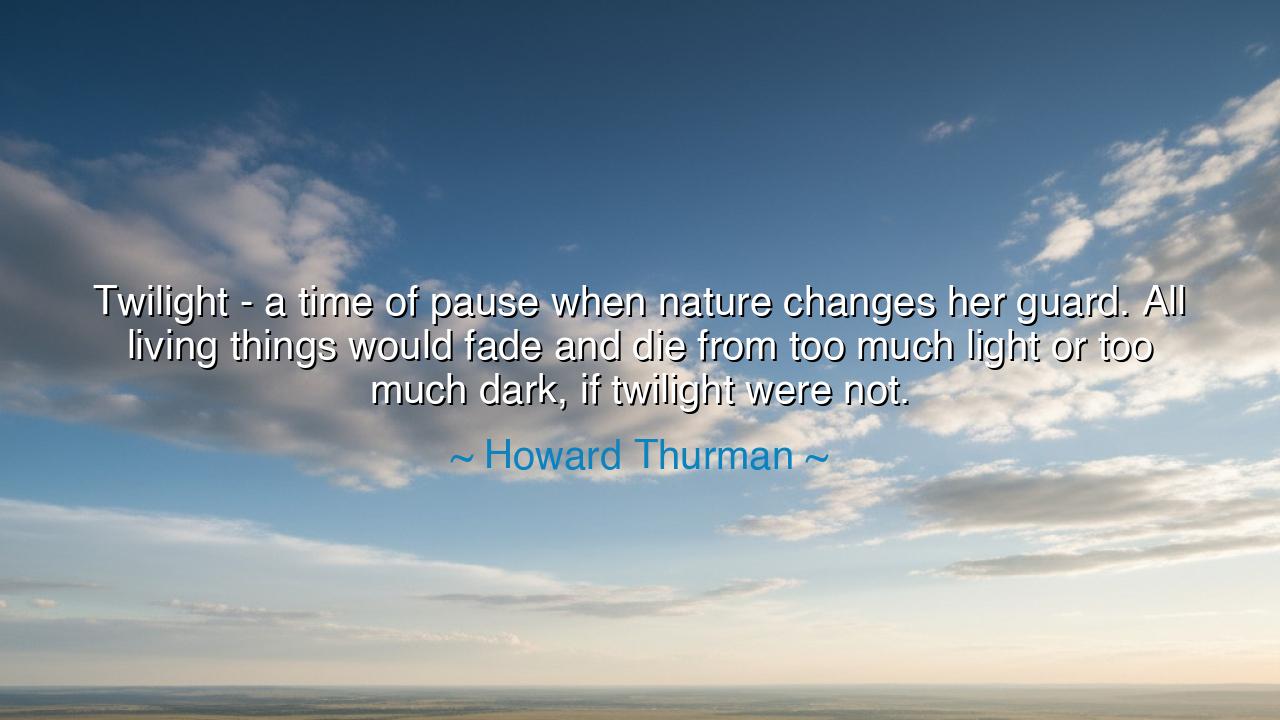
Twilight - a time of pause when nature changes her guard. All
Twilight - a time of pause when nature changes her guard. All living things would fade and die from too much light or too much dark, if twilight were not.






Attend, O seeker of the eternal rhythms, to the words of Howard Thurman, who spoke of twilight as “a time of pause when nature changes her guard. All living things would fade and die from too much light or too much dark, if twilight were not.” In these words rests a profound meditation on the delicate balance of existence, a recognition that life thrives not in extremes, but in the liminal spaces where transition and rest meet. The ancients, who watched the sun bow to the horizon and the stars awake in silence, would have understood this: twilight is not mere absence of light, but a sacred interlude, a moment of harmony and renewal.
Thurman, a revered theologian, philosopher, and mystic, spoke often of the necessity of reflection and spiritual attentiveness. Born in 1899, his life bridged eras of profound change, and he understood that life itself unfolds in cycles, that neither day nor night alone can sustain the flourishing of the soul. His contemplation of twilight mirrors his larger philosophy: that balance, patience, and pause are essential to human well-being, and that in the interstices of life—between action and rest, joy and sorrow, certainty and doubt—we discover the profound truth of our existence.
Consider, O listener, the wisdom Thurman unveils: too much light—unbroken activity, constant striving, the glare of unrelenting attention—can scorch the soul, leaving it barren. Too much dark—despair, isolation, and relentless sorrow—can diminish the spirit, eroding hope and vitality. Twilight, that gentle meeting of day and night, provides pause, a sacred threshold where the world exhales, where the heart can rest, and where new understanding can take root. In the natural world, animals emerge and recede; plants sway in the temperate glow, neither scorched nor frozen.
A historical mirror of this truth may be found in the life of George Washington Carver, who taught and cultivated in quiet obscurity, often working before dawn or after dusk. Carver observed the subtleties of nature, finding guidance in the liminal spaces of the day. He knew that the hidden rhythms of soil and seed, the gradual unfolding of a plant, were as instructive as any bright revelation. Carver’s attentiveness to twilight moments—to the small, understated pauses in life—allowed him to produce wisdom and innovation that nourished generations. Thurman’s meditation on twilight finds resonance here: the sacred spaces between extremes are where insight and life thrive.
O listener, understand that twilight is not merely a time of day, but a metaphor for life’s cycles. All living things, from the smallest insect to the mightiest tree, depend upon intervals of rest and transition. To ignore these moments, to persist without pause, is to invite burnout, decay, or loss of harmony. Thurman’s words teach that we must honor both our activity and our stillness, for they are the twin forces that sustain existence.
Practical guidance flows from this wisdom. Begin by recognizing your own twilight moments—those periods of quiet reflection between work and rest, joy and sorrow, action and contemplation. Allow your mind to pause, to breathe, to observe without judgment. In these intervals, seek balance: neither overexposure to the tasks of the world nor surrender to the shadows of fatigue and doubt. Just as nature protects her children through twilight, so too must we cultivate space for renewal and insight.
Consider, also, the beauty and the fragility of these pauses. Just as twilight is fleeting, so too are the moments in which the soul can recalibrate. Watch the setting sun, hear the hush of evening, feel the soft quiet between storms and sunshine. In these moments, presence becomes the teacher, guiding the heart to understand that life’s vitality depends on balance, and that wisdom emerges in the gentle meeting of light and dark.
Thus, O seeker, carry Thurman’s teaching in your heart: embrace your twilights, honor the pauses, and recognize that neither unceasing light nor endless dark can sustain you. In these sacred intervals, life itself balances, nature guards her children, and the soul replenishes. By attending to the quiet transitions, you nurture resilience, insight, and harmony, walking the path of life with wisdom that spans generations.






AAdministratorAdministrator
Welcome, honored guests. Please leave a comment, we will respond soon